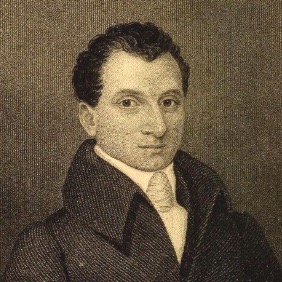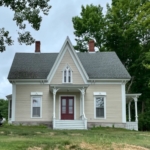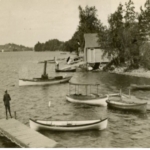The first Methodist foreign missionary was a son of Central Maine

In 1833, Rev. Melville Cox (1799-1833) of Hallowell, was the first to serve as a Methodist foreign missionary. A historical marker, in Hallowell, tells of the short but successful career of Rev. Melville B. Cox.
by Dale Potter-Clark
In October, 1793 the Methodist itinerant minister, Jesse Lee from Virginia first preached in Hallowell and a Methodist Society was formed. Capt. Charles Cox and his wife Martha, of Hallowell, were the first two converts to Methodism in that town. In 1799 Martha gave birth to twins, Melville and Gershom and when a revival was held there in 1800 the couple had their sons baptized. Both of the boys grew up to become Methodist ministers.
At age 18, Melville Cox felt called to the ministry while on a walk alone in the woods near his home, and he began preaching by age twenty. He became licensed to preach by the Kennebec District Conference, in March, 1821 and in 1822, received his first appointment as an itinerant preacher. In 1823 he served the Exeter, New Hampshire, circuit and in 1824 he was assigned to Buxton. Preaching on Methodist circuits was a tough existence in those days when itinerants often slept on the cold ground at night on their travels between towns, and during the winter months they sometimes awoke covered in snow. That life took its toll on Rev. Cox who became stricken with tuberculosis and he was forced to return home in 1825.
In 1827-28 Rev. Cox served in a supervisory position for the Kennebec circuit and during that time the Methodists decided they should build a church in Hallowell. Rev. Cox was chosen to find and secure land where a new structure would be raised, and on February 8, 1826 the Methodist trustees paid $325.00 to Samuel & Martha Prescott of Hallowell for a parcel on 5th Street. The church was later dedicated as “Cox Memorial” in honor of Rev. Cox.
His next assignment was in Virginia in 1828, the same year he married Ellen Cromwell, of Baltimore, Maryland, and their daughter was born. Still in ill health, he gave up the ministry and worked as the editor of biweekly The Itinerant, also known as Wesleyan Methodist Visitor and published in Baltimore 1830-31. Then tragedy struck in 1830 when both his wife and daughter died during a cholera epidemic and he soon after followed his calling back to the ministry. His brother, Gershom became a Methodist minister about 1827 and for 40 years served churches throughout Maine and New Hampshire. Melville’s Methodist tentacles reached far beyond those of his brother, for in spite of his grief and ill health he became interested in foreign missions.
The Methodist Episcopal Church had formed a Missionary Society in 1819, but a suitable foreign missionary had not yet been found – until 1832 when Rev. Melville Cox agreed to a serve a colony for freed American slaves in Monrovia, Liberia, Africa, making him the first ever overseas Methodist missionary. He boarded the ship Jupiter, on November 6, 1832, bound for West Africa. Having already made plans for what he hoped to accomplish in Liberia, he wrote in his journal on the voyage, “In making up my mind and in searching for a passage to go out, I have followed the best light I could obtain. I now leave it all with God…”
Rev. Melville Cox arrived in Liberia on March 9, 1833, but given his already weakened condition from tuberculosis he soon succumbed to malaria fever and died that July. In those five months Rev. Cox had organized the Methodist Episcopal Church, in Liberia, and founded the College of West Africa which he modeled after the Maine Wesleyan Seminary (Kents Hill School), in Readfield, where his brother was a Trustee.
A historical marker sits on the banks of the Kennebec River, in Hallowell, that tells of the short but successful career of Rev. Melville B. Cox. In 1835 Rev. Gershom Cox wrote a 240-page biography about his brother titled, Remains of Melville B. Cox, Late Missionary to Liberia: With a Memoir.
Responsible journalism is hard work!
It is also expensive!
If you enjoy reading The Town Line and the good news we bring you each week, would you consider a donation to help us continue the work we’re doing?
The Town Line is a 501(c)(3) nonprofit private foundation, and all donations are tax deductible under the Internal Revenue Service code.
To help, please visit our online donation page or mail a check payable to The Town Line, PO Box 89, South China, ME 04358. Your contribution is appreciated!





Leave a Reply
Want to join the discussion?Feel free to contribute!